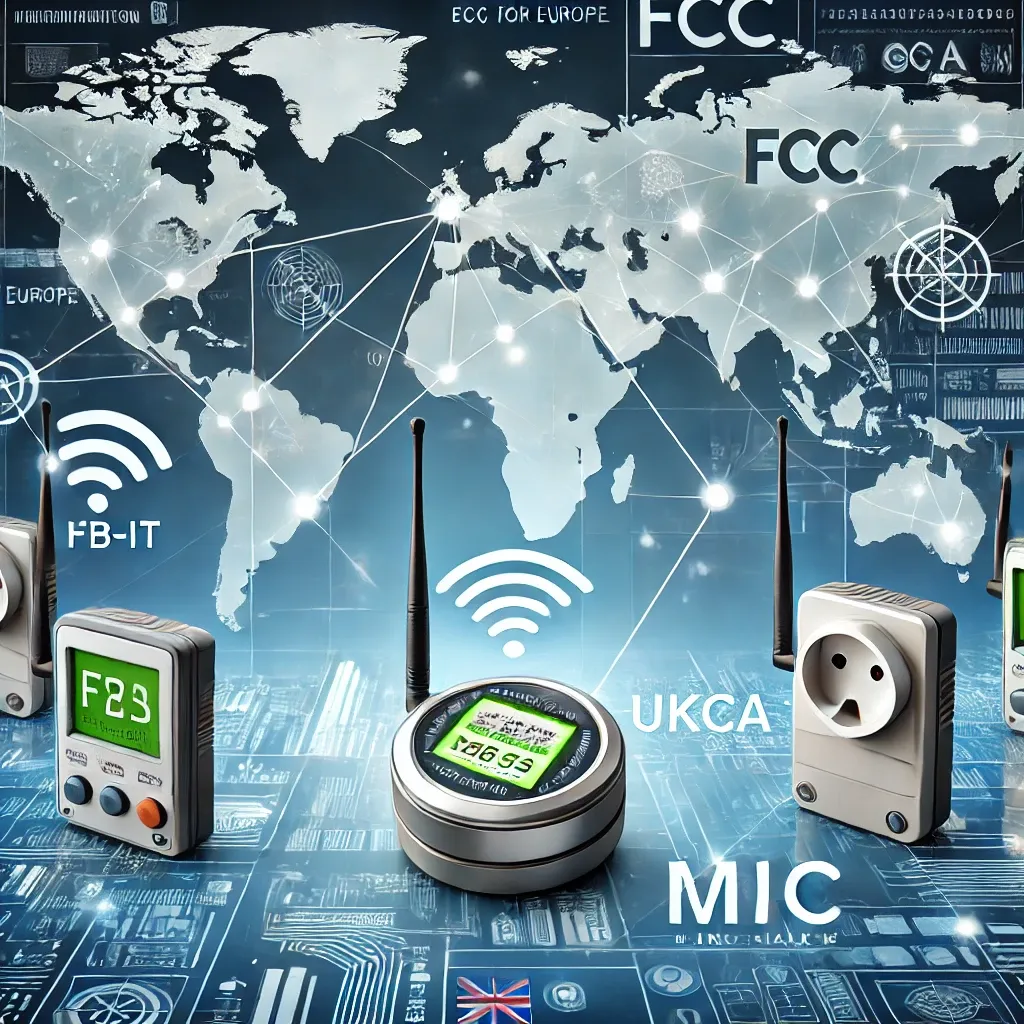Successfully launching an NB-IoT device requires more than technical development—it also involves navigating complex global certification requirements. Certification ensures that your device complies with regional regulations, guaranteeing it can legally and safely operate. This blog covers key certification processes in the U.S., Europe, UK, Japan, and China, while incorporating the growing role of cybersecurity regulations.
Why Certification and Cybersecurity Matter
Certification is not just a bureaucratic hurdle—it’s a crucial step to ensure your NB-IoT device meets radio frequency (RF) standards, performs safely, and complies with local regulations. Additionally, with the rise of cyber threats, more regions are introducing cybersecurity regulations to protect IoT devices from hacking, data breaches, and unauthorized access.
FCC Certification in the U.S.: Radio Compliance and Cybersecurity
The Federal Communications Commission (FCC) manages all wireless devices in the U.S. to ensure they don’t interfere with other communication systems. NB-IoT devices generally need to comply with
- FCC Part 27: Governs licensed cellular bands used for IoT.
- FCC Part 15: Covers unlicensed bands (less common for NB-IoT).
Recently, cybersecurity concerns have taken center stage in U.S. compliance. The FCC has implemented measures to ensure that IoT devices, including NB-IoT, are secure against potential cyberattacks. Manufacturers must ensure their devices adhere to data privacy and security measures.
For more on FCC certification and cybersecurity standards for IoT, check out this guide.
The European Union and RED: One Mark, Many Countries, Cybersecurity Included
For devices in the EU, the Radio Equipment Directive (RED) 2014/53/EU outlines essential requirements for RF efficiency, EMC (Electromagnetic Compatibility), and device safety. Once your device passes these tests, it can be marked with the CE label, granting market access across the EU.
The upcoming 2025 EU cybersecurity regulations introduce stricter compliance standards. IoT manufacturers must adhere to Articles 3.3(d), (e), and (f), which focus on protecting personal data, ensuring network security, and preventing fraud. These rules aim to create safer, more secure IoT devices across the region.
You can read more about the upcoming EU cybersecurity rules for IoT here.
The UKCA and Cybersecurity: Strengthening IoT Protection
Post-Brexit, the UK Conformity Assessed (UKCA) mark is now required for all NB-IoT devices sold in the UK. The certification process is similar to the EU’s CE marking but specific to the UK’s regulations.
A key aspect of UK certification is its increased focus on cybersecurity through the Product Security and Telecommunications Infrastructure (PSTI) Act. This act introduces requirements like banning default passwords on IoT devices and ensuring security updates are available. IoT device manufacturers must comply with these new rules to ensure secure deployment in the UK.
For more details on UK cybersecurity laws for IoT, visit this page.
MIC Certification in Japan: Strict Compliance
In Japan, the Ministry of Internal Affairs and Communications (MIC) governs all radio frequency devices. What makes Japan unique is that it does not accept foreign certifications, so even FCC or CE-certified devices must be re-tested in Japan.
To sell your NB-IoT device in Japan, it must comply with Technical Regulations Conformity Certification (TRCC). This rigorous process ensures the device operates within Japan’s frequency allocations and is safe for use.
For more information, visit the MIC Japan website at www.soumu.go.jp.
China and SRRC: One Certificate, One Market
In China, all radio-transmitting devices, including NB-IoT, must be certified by the State Radio Regulatory Commission (SRRC), regulated by the Ministry of Industry and Information Technology (MIIT). SRRC certification ensures your device operates within China’s strict RF guidelines and does not interfere with other communication systems.
Key steps include:
- Submitting your device for RF testing in accredited Chinese labs.
- Providing technical documentation for review.
- Once approved, your device receives the Radio Type Approval Certificate, allowing it to enter the Chinese market.
For detailed information, visit the MIIT website at www.miit.gov.cn.
NB-IoT Frequency Bands: A Global Overview
One of the most critical aspects of NB-IoT certification is the frequency bands used by your device. These vary from region to region, but common bands include:
700 MHz – 900 MHz:
Widely used in Europe, Asia, and North America for broad coverage and long-range IoT applications.
850 MHz – 900 MHz:
Common in North America and parts of Asia, offering efficient wide-area coverage.
1800 MHz – 2100 MHz:
Used primarily in urban areas with higher device density but shorter range.
2100 MHz and above:
Densely populated areas may use higher bands, balancing bandwidth and range.
How IoT Consulting Partners Can Assist You
Navigating the complex landscape of NB-IoT certification and cybersecurity compliance can be daunting. This is where IoT Consulting Partners Group steps in to help:
- Expert guidance on FCC, MIC, RED, UKCA, and SRRC certifications.
- Comprehensive cybersecurity compliance assistance, ensuring your IoT devices meet the latest regulations in all target markets.
- Testing coordination with accredited labs worldwide.
- Documentation preparation to streamline the certification process.
Partner with us to simplify your certification journey and ensure your NB-IoT devices meet global standards.


